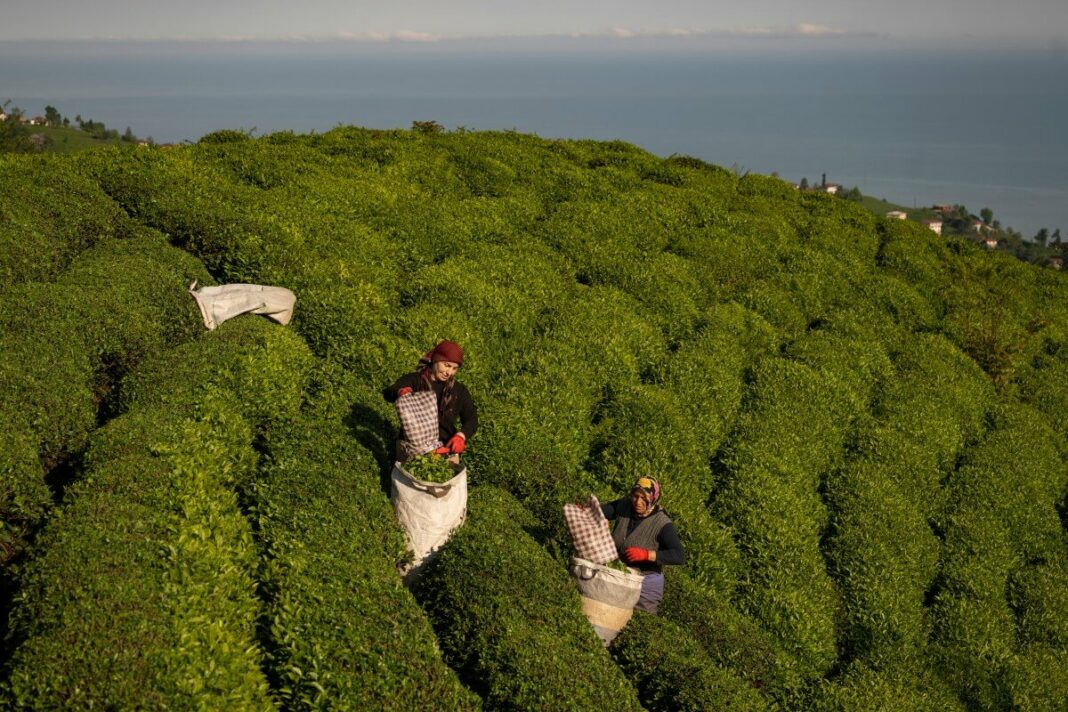Every time it rains heavily in Turkey’s spectacular Black Sea tea growing region — where it rains a lot — Zikrullah Kömürcü starts to worry.
Last August he was almost swept away by a mudslide when a tea garden above his home in the village of Abdullahhoca began to slide down the mountain during a downpour.
The house above his was destroyed with part of the field ending up in his kitchen.
“It’s a miracle that no one was killed,” Kömürcü told AFP, an electricity pylon still perched dangerously over his mud-splattered home.
The tea-growing province of Rize in Turkey’s northeast has been repeatedly hit by major landslides over the last 50 years.
Nearly twice as wet as Ireland, with 2.2 meters (86 inches) of annual rainfall, the Turkish disaster agency, Disaster and Emergency Management Authority (AFAD), said last year alone there were 355 serious landslides there affecting homes.
And it is going to get worse, experts warn, with climate change making the Black Sea warmer and rainstorms even more violent, putting still more pressure on the soil.
Dangerous monoculture
Hakan Yanbay, of the province’s chamber of geological engineers, said the “uncontrolled” construction of roads cut into the sides of mountains to link its scattered villages has exacerbated the problem.
They undermine the stability of the soil of the mountainous region, 80 percent of which is made up of steep hillsides.
Yanbay blames the spread of tea plantations over the last century for much of the soil erosion. Long encouraged by the state, they now take up a staggering 90 percent of the region’s agricultural land.
While no one has died in a landslide in Rize in nearly three years, three workers were swept away in one in neighboring Trabzon province in March — 40 kilometers (25 miles) from Abdullahhoca.
But painful memories of other disasters that have claimed 130 lives in Rize since the 1960s are never far from the surface.
“We are going to prevent the floods and landslides that we have been experiencing in the Black Sea region for years,” Turkish President Recep Tayyip Erdoğan — whose family comes from Rize — vowed in April.
After six villagers were killed in floods and mudslides in 2021, Erdogan called for a ban on “five to 10-story buildings being put up on hillsides.”
The president was scathing about the damage being done. “Look at what nitrogen fertilizers are doing to the tea gardens,” he said on a visit to Rize after that disaster. “They’re turning the soil into mud,” he added.
‘Man-made disasters’
But three years later “no serious measures have been taken,” insisted Tahsin Ocaklı, the only opposition MP in the province dominated by Erdoğan’s Justice and Development Party (AKP).
Ocaklı, who has demanded a parliamentary inquiry, said that “these events, which are now happening several times a year, are no longer natural catastrophes but man-made disasters.”
The Rize chamber of agriculture raised the alert about discounted nitrogen fertilizers being sold in February, warning they were likely to further undermine the soil.
But experts say the real problem is the tea plants themselves whose roots are not deep enough to stabilize the ground.
They recommended planting trees like poplars and eucalyptus whose deeper roots absorb more water.
To try to reduce the risks, the authorities have begun building drainage channels and retaining walls below some tea gardens.
A concrete barrier has been built to protect the home of Zikrullah Kömürcü’s nephew, who lives near him in Abdullahhoca.
Kömürcü and his wife Medine are waiting for a similar one to shield them.
“Every time it rains, we wonder if there will be another landslide,” Medine said. “I don’t sleep anymore — we’re afraid.”
© Agence France-Presse


